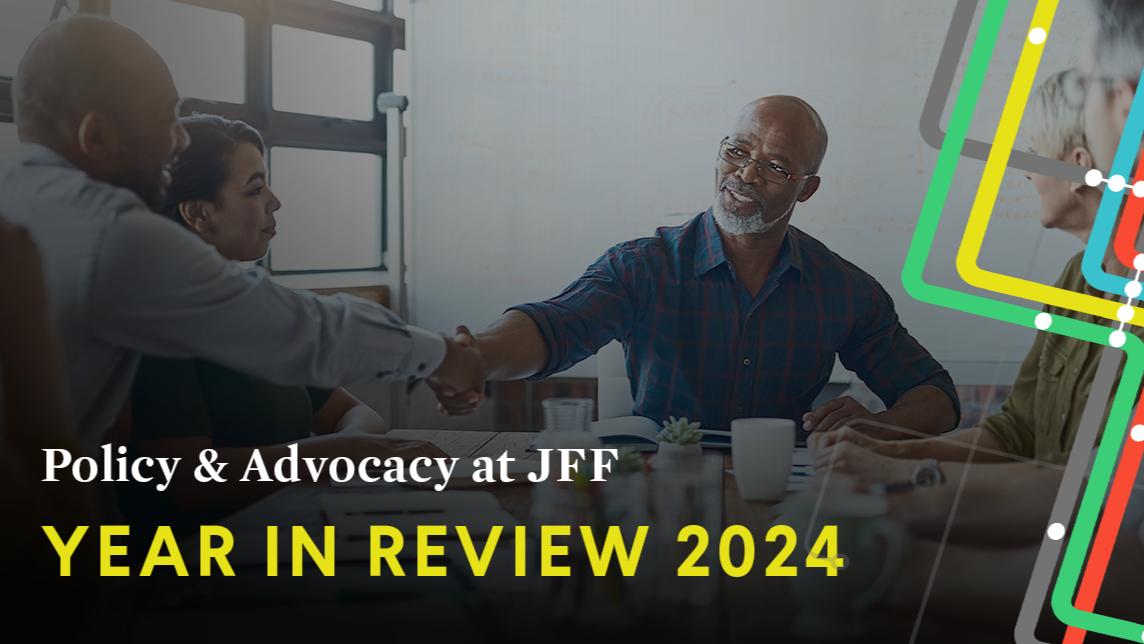

JFF’s Top Policy Wins in 2024

Jobs for the Future (JFF)
Building a Future That Works.
Published Dec 19, 2024 + Follow

This election season, JFF launched its first-ever advocacy campaign, No Dead Ends, to draw attention to the kitchen table issues that voters across political divides care about, to elevate common-sense policy ideas that both parties support, and to make education and workforce systems more responsive to the needs of the modern economy.
As 2024 comes to a close, we are excited to share our top policy wins across the key priority areas of our No Dead Ends campaign.


Providing practitioner insights to Congress to inform the proposed WIOA reauthorization
A major policy priority of No Dead Ends is empowering people with data, guidance, and resources that enable them to navigate their work and learning journeys. That means providing learners and workers with timely labor market information, career guidance, and flexible resources to support their skills development efforts and inform their career decisions.
Strong majorities of registered voters surveyed by JFF in September told us they agree: 84% of voters polled by JFF said they support policy action to improve career guidance, while 70% or more said they support increasing funding for job training and short-term credential programs with value in the labor market.
The country needs a strong national infrastructure to prepare people for and connect them to good jobs. That’s why at JFF we are encouraged that Congress is pursuing reauthorization of the Workforce Innovation and Opportunity Act (WIOA). In 2024, JFF played an active role in shaping key provisions of the bipartisan bill, including proposals for stronger workforce data and improvements to the Eligible Training Provider List, as well as an increased focus on employer-led training efforts in high-demand sectors.
Highlights of our engagement include:
Testifying before the Senate Committee on Health, Education, Labor, and Pensions.
Issuing a federal policy playbook for overhauling the workforce development system, as well as a series of issue briefs focused on transforming training and improving data access and alignment, based on the recommendations of a JFF task force of workforce leaders.
Hosting congressional staff trips to Texas and North Carolina, where participants gained firsthand insights on local workforce development board efforts to expand opportunities for workers and jobseekers.
Co-leading the development of a coalition letter to federal policymakers urging them to take action to strengthen the workforce data ecosystem.

Read our analysis of the proposed WIOA reauthorization bill, the “A Stronger Workforce for America” Act.

Leading the national conversation on skills-first approaches to education and employment
Another priority of No Dead Ends is recognizing everyone’s skills, knowledge, and expertise, regardless of when or where their learning and development experiences occur. That means emphasizing approaches that promote things like skills-based hiring, the use of digital learning and employment records, competency-based education, and credit for prior learning.
Voters we polled told us they agree: 84% said they support skills-based hiring, while 79% said they support policies that expand awarding credit for prior learning. Yet, despite political support for skills-based hiring, the nation’s education and workforce policies and systems are mostly stuck in the past—overemphasizing degrees and seat-time-based programs.
In 2024, JFF pushed discussions of policies to promote skills-first models in education, workforce, and employment systems by:
Holding a federal policy summit, in partnership with the Skills First Coalition , bringing together congressional staff, state policy officials, corporate leaders, and education and workforce practitioners to explore federal policy levers for validating and catalyzing nondegree-based indicators of individuals’ skills.
Advising governors’ offices and state agency officials on effective skills-based hiring approaches during the National Governors Association 's Skills in the States summit.

Read JFF’s skills-first policy playbook.

Joining forces with federal and state leaders to champion career-connected learning for youth and young adults
No Dead Ends also prioritizes erasing the boundaries between learning and work to foster common purpose among educators and employers. This means smoothing the transitions from high school to postsecondary credential programs and the world of work through intentional forms of dual enrollment and high-quality work-based learning experiences.
Voters JFF polled indicated that they’re in favor of policies that promote careerconnected learning: 84% said they support policy action to expand apprenticeship programs, while 81% said K-12 and higher education curricula should prepare students for high-wage jobs in growing industries that require advanced skills.
In 2024, JFF partnered with federal and state policymakers to promote policies that advance our “Big Blur” vision—which calls for greater integration between high school, college, and careers. Those efforts included:
Promoting Colorado’s impressive policy efforts at the Education Policy Forum of the National Conference of State Legislatures (NCSL). JFF moderated a panel discussion with officials from the Colorado Department of Education and the Colorado Governor’s Office about major policy wins stemming from recommendations made by a state task force, dubbed the Big Blur task force, which JFF advised.
Partnering with the Biden administration to organize the Classroom to Career Summit to celebrate effective approaches for expanding career pathways to good-paying jobs in the infrastructure, clean energy, and advanced manufacturing sectors. The summit featured a cabinet member panel discussion and was attended by senior administration officials and nearly 200 education and workforce leaders.
Holding federal policy forums for congressional staff and executive branch officials to examine states that are effectively expanding “intentional” dual enrollment policies and explore federal policy enablers and blockers. The forums were inspired by a JFF policy brief titled From Fragmented to Focused: Intentional Dual Enrollment and the Federal Role in Maximizing Student Experiences. Co-developed with Advance CTE and the College in High School Alliance, the brief focused on the need for improving federal policies that support high-quality dual enrollment.

Dig into JFF’s state policy resources for building momentum toward the Big Blur, including a suite of issue briefs, state case studies, and a state policy framework.

Sharing new research and innovations for removing policy barriers to economic opportunities
The fourth policy priority of No Dead Ends is helping people get ahead during times of economic uncertainty and personal adversity. That means removing structural barriers through policies that promote fair-chance hiring and educational opportunities for people with criminal records, outcomes-based financing measures for postsecondary education and training that encourage risk-sharing and cost-sharing, and reforms of public benefits programs that support caregivers and foster economic advancement.
Strong majorities of the voters JFF polled indicated that they support action on a range of economic security measures: 77% said they support increased tax credits for parents and employers to make child care more affordable and widely accessible; 68% said they support “banning the box”—or eliminating questions about criminal records on job and school applications—and automatically expunging old, low-level offenses from people’s records; and 60% said they support income-based repayment of student loans.
In 2024, JFF engaged policymakers to expand their understanding of the lived experiences of learners and workers and of the effectiveness of innovative approaches to improving access to postsecondary education and skills training by:
Conducting groundbreaking research on how strong, income-based features in education financing can prevent student loan debt from exacerbating racial disparities and sharing our findings and policy recommendations during meetings and briefings with House and Senate offices and with state legislators on the NCSL’s “Our American States” podcast.
Informing state actions on prison education by contributing to the development of North Carolina’s Reentry 2030 Strategic Plan and by hosting Maine state legislators on visits to state correctional facilities to meet people who earned college degrees while incarcerated.
Presenting research and recommendations for policies that will help build a workforce that’s prepared for a future of work shaped by artificial intelligence during several meetings with state legislators, including at the Eastern Regional Conference of The Council of State Governments .

Learn more about JFF's #NoDeadEnds policy priorities.

No Dead Ends is JFF's national policy campaign to eliminate dead ends for all learners and workers.
Stay Connected
Sign the No Dead Ends pledge to join us and at least 90 other individuals and organizations who have already joined the movement.
Subscribe for updates on policy and advocacy from JFF.
Read JFF's federal policy blueprint for the incoming Trump administration's first 100 days.
Share #NoDeadEnds on LinkedIn.
Contact the JFF Policy & Advocacy team.
#policy #federalpolicy #educationpolicy #workforcepolicy #workforce #workforcedevelopment #wkdev #education #HigherEd #K12 #dualenrollment #BigBlur #skillsfirst #innovativefinance #studentloans #studentdebt #WIOA #ETPL #training #data
Like Comment Share
To view or add a comment, sign in
